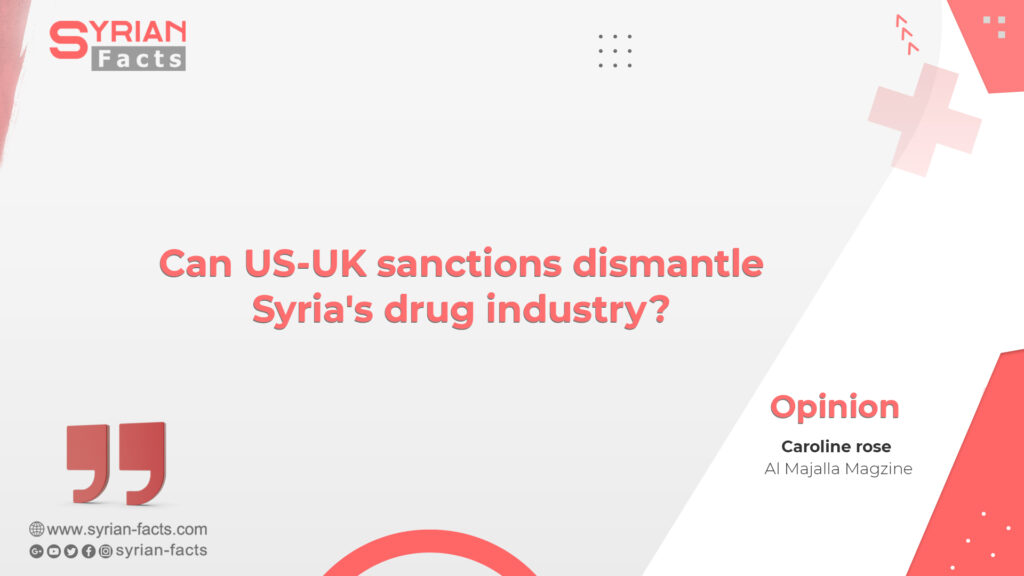This week, the US Department of the Treasury’s Office of Foreign Assets Control (OFAC) and UK’s Foreign Commonwealth and Development Office (FCDO) announced that both governments have imposed joint sanctions against Syrian and Lebanese individuals affiliated with the Syrian regime and Hezbollah — all implicated in the illicit trade of the amphetamine-type stimulant Captagon throughout the Mediterranean-Gulf zone.
The joint announcement acknowledged the trade’s growing influence in the region’s security, health, and political landscape, growing into an illicit economy estimated to be worth over $10 billion in value.
The FCDO identified 11 individuals involved in various stages of Captagon production and smuggling and identified the Captagon trade as a concerning “financial lifeline” for the Syrian regime.
The US, however, was more conservative in its sanctions list, designating seven individuals — some of which already in pursuant to the Caesar Syrian Civilian Protection Act of 2019.
Still, the joint sanctions designations indicated a new chapter for US-UK transatlantic cooperation and strategy-building against Syrian President Bashar al-Assad’s regime and Iran-backed actors in the Middle East.
The sanctions were a long time in the making, based on years of accumulated evidence and investigative reports tracking state and non-state actors’ involvement in the Captagon trade — notably close affiliates of the Syrian regime, Hezbollah, and IRGC-aligned militias.
The decision for sanctions also come at a notable time, just months ahead of a much-anticipated Department of State reveal for its inter-agency counter-Captagon strategy, requested under the “CAPTAGON ACT” which was passed by the US Congress in December 2022.
However, the significance of the announced sanctions extends beyond shared US and UK governmental wishes to stem illicit trades, with broader geopolitical objectives in mind.
A booming trade
The Captagon trade has boomed in the Middle East in the last five years, as individuals and groups closely aligned with the Syrian regime and its security partners — Hezbollah and Iran-backed militia groups — have turned to the trade for alternative revenue streams amidst the economic pressure of sanctions.
Evidence has mounted over the involvement of Fourth Division officials presiding over the production of Captagon, facilitating small to industrial-scale manufacturing across regime-held areas in Latakia, Homs, Aleppo, Damascus, and along the Syrian-Jordanian border.
Formal maritime ports exclusively controlled and accessed by the Syrian regime, such as the Port of Latakia, have been frequently used to dispatch some of the largest Captagon shipments to transit sites such as Piraeus, Salerno, Constanta, and other ports across the Mediterranean and Red Sea.
In the last year, there has also been stacking evidence that pro-regime militias and even members of the Syrian Military Intelligence Directorate have been establishing small-scale laboratories along the southern Syrian border, prime for trafficking efforts through Jordan and Iraq.
Additionally, some of the Syrian regime’s closest partners on the ground, Hezbollah and IRGC-aligned militias, have stood up small-scale parallel trafficking and production operations in the Bekaa Valley and have supported Fourth Division trafficking efforts in the south, either arming smugglers, facilitating shipments through routes, or providing access to different ports outside of Syria.
In the last few years, the Captagon trade has grown drastically in both size, value, and geographic scope. Once largely confined to production sites in the Levant and destination markets in the Arab Gulf, the trade has carved out new transit sites as traffickers seek to identify new, creative ways to reach Gulf consumer markets.
Alarm bells
Jordan, Iraq, Lebanon, and Turkey have rung alarm bells over increased frequency of Captagon seizures, as well as evidence of rising consumption amongst local communities. The variety and price of Captagon pills have also begun to vary drastically, with new variants — usually signified by colour and street name — that have different potencies, cutting agents, and prices depending on the potency of amphetamine within the pill.
Still, the trade has continued to explode in value, with less qualitative pills close to production sites priced around a few dollars to more qualitative pills, closer to richer consumption markets in the Arab Gulf, and with higher concentrations of amphetamine priced up to $15 per pill.
In the last three years, various investigations and reports from research centres have estimated the trade’s value — largely accounting for just what has been seized by law enforcement — has expanded from $3.47 billion in 2020, $5.7 billion in 2021, to $10 billion in 2022.
While the Captagon trade’s illicit network is widespread — with many intermediaries, smugglers, dealers, manufacturers, and other actors implicated across the region — the estimated value of the trade is notable, exponentially larger than Syria’s licit exports.
The massive source of revenue for industrial-level producers in Syria, combined with mounting evidence of involvement in the trade amongst regime-aligned actors, have flagged concern from Western governments.
These malign actors’ use of Captagon as not only a revenue source, but a lucrative, profiting avenue to undercut the effects of US, UK, and EU sanctions, has drawn increased attention from Washington and its partners over the years, mounting calls for a pivot in its strategy on Syria to include a strong counter-Captagon dimension.
Read more: Why global sanctions on Iran matter
The Captagon trade flew under the radar of the US and its partners for years, lacking any robust inter-agency process to monitor the trade and implement effective policies to curb its influence in the region.
Recent investigative works, analytical assessments, and mounting evidence on the Captagon trade’s strong nexus with state and non-state malign actors in the region have compelled the US and its partners to take action, with concerns about the trade’s negative effects on public health and human security.
Recent counter-Captagon push
However, a key geopolitical driver has also pushed the US and UK to advance a robust counter-Captagon strategy in recent weeks. The destructive earthquake and resulting humanitarian disaster in southern Turkey and northern Syria has opened the floodgates for normalisation efforts between the Syrian regime and many of its regional neighbours, including Jordan, the UAE, Oman, and even Saudi Arabia.
As al-Assad has made his series of visits to regional capitals, engaged in phone calls with leaders, and has leveraged the Captagon trade as a top agenda-item in on the normalisation discussions, the US and its partners have watched with concern, seeking to turn the tide of rapprochement it considers premature and ill-advised.
Read more: Escalation in Syria comes amid regional détente
The US and the UK have, therefore, sought to raise the profile of the Captagon challenge with regional partners heavily considering normalisation efforts, showcasing evidence of illicit participation amongst regime and Iran-aligned actors.
The announced sanctions are no doubt a warning that Washington and London are from changing their policy on isolating the al-Assad regime, let alone removing any punitive measures on Syrian officials and allies.
Both countries seek to use these sanctions as a message to regional partners that they will not accept normalisation with Syria and are committed to continued economic and political isolation of the al-Assad regime.
New moment in transatlantic cooperation
The joint US-UK designated sanctions decision marks a new moment in joint transatlantic efforts on the Captagon trade. It indicates that the US and UK are perceiving the Captagon trade as a key threat to regional stability, human security, health, and shared geopolitical interests in the Middle East, Mediterranean, and North Africa.
The inclusion of Lebanese and Syrian individuals on each countries’ sanctions list also indicates that both governments do not see the Captagon trade as a Syria-specific challenge, but a cross-border, transnational illicit economy that deserves greater inter-agency coordination and attention.
It’s likely that this is the first of many US-led initiatives to increase monitoring, accountability, and policy action against the main drivers behind the Captagon trade affiliated with the Syrian regime and its Iran-aligned proxies, as the US seeks to dissuade regional normalisation efforts and showcase new avenues of leadership and engagement in the region.
Strategy unveiling
Early this summer, the State Department is expected to unveil its inter-agency strategy and progress made towards countering the Captagon trade as it relates to the al-Assad regime and outline how this platform will facilitate multilateral coordination with partners in constraining the trade.
Additionally, it’s likely that many Western partners, such as the UK and the EU, will adopt similar counter-Captagon strategies that will enable greater intelligence-sharing, joint sanctions destinations, increasing interdiction capacity, demand-reduction strategies, and dialogue over the growing Captagon trade.
How constricted Captagon actors will be after these imposed joint sanctions is unclear. Many of these individuals will be largely or marginally unaffected by the imposed travel bans and asset freezes, continuing to identify avenues to expand the trade and increase profits.
However, these sanctions served an important role of accountability for the US and UK, as they seek to not only monitor Captagon as an illicit risk in the region, but also to warn partners in the region against normalisation the with al-Assad regime.
Al Majalla Magzine





Be the first to write a comment.